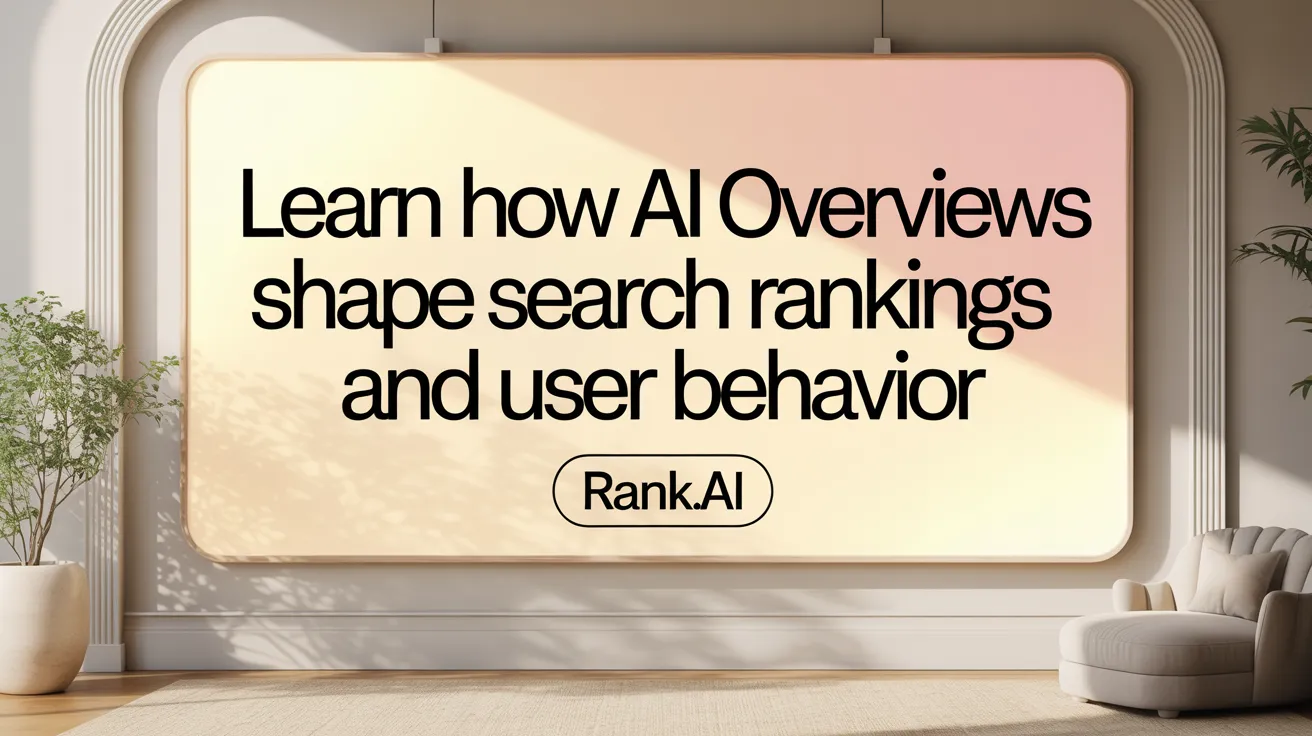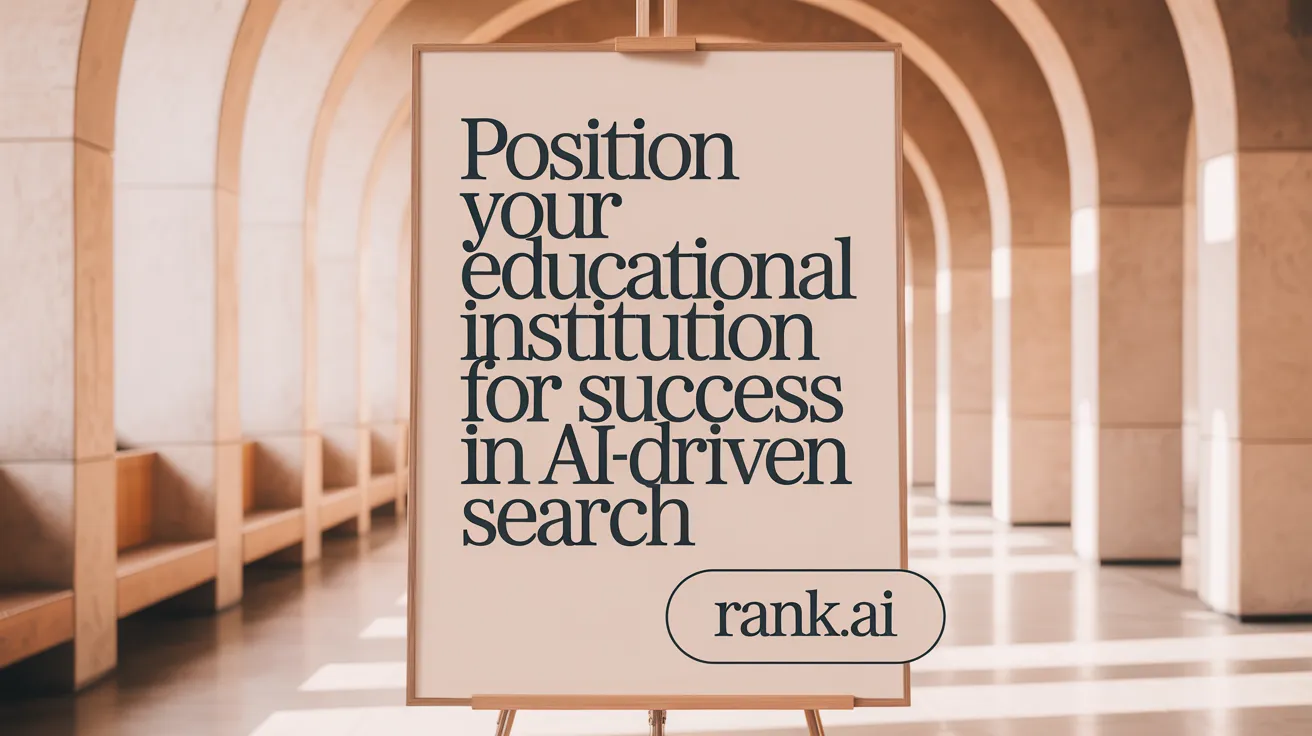Navigating the Future of Search with AI
Google's integration of advanced AI technologies like AI Overviews and AI Mode is revolutionizing how users interact with search results. This shift demands a fundamental reevaluation of traditional SEO strategies as website owners and marketers face new challenges and opportunities to enhance visibility and engagement in an AI-augmented search landscape. This article explores strategic approaches to optimizing websites, aligning content with Google's AI directives, and adapting SEO methodologies to thrive alongside these groundbreaking AI search features.
Optimizing Websites for Google’s AI-Enhanced Search Results

What strategies can be used to optimize websites for Google's AI-enhanced search results?
To stay ahead in Google's evolving search landscape, website owners should adopt a multi-faceted SEO approach tailored to AI-driven features. Focus first on producing high-quality, original, and detailed content that directly addresses user intent. Comprehensive content that answers specific questions and covers topics extensively will be favored in AI overviews and multimodal responses.
Implementing structured data, such as schema markup, is crucial. Structured data helps Google’s AI understand the context, relevance, and relationships within your content. When correctly applied, it can enhance your chances of earning rich results like featured snippets, knowledge panels, and multimodal features integrating images or videos.
Technical SEO plays a vital role in supporting AI search. Ensure your site loads quickly across devices, uses mobile-friendly design, avoids server errors, and maintains a clear, logical architecture. Make sure Googlebot can crawl and index all important pages without barriers like blocked resources or improper HTTP status codes.
Organize your content in a way that appeals to AI algorithms by using clear hierarchical headings, concise language, and FAQ sections that target common user questions. Incorporate multimedia elements such as relevant images, videos, and interactive media to support multimodal search, which combines text, visuals, and videos.
As AI search features evolve—such as AI Overviews and AI Mode—it's essential to stay updated on the latest trends. Adjust your SEO strategies by focusing on authority, reputation, and trustworthiness, aligning with Google's emphasis on E-E-A-T (expertise, experience, authority, and trust). Use broad match keywords appropriately in paid campaigns, optimize for high-performance keywords, and ensure your content remains relevant across different AI and multimodal formats.
By integrating these tactics—quality content creation, technical diligence, structured data implementation, multimedia use, and trend adaptation—you can enhance your website’s visibility and performance in the AI-powered search environment. This comprehensive approach helps meet user needs effectively and builds a resilient SEO foundation for the future.
Aligning Content Creation with Google's AI Policies and Quality Standards

What are the best practices for aligning content creation with Google's AI content policies and quality standards?
Creating content that meets Google's evolving AI policies involves a focus on originality, helpfulness, and a user-first approach. This means producing material that genuinely serves the needs of your audience, presenting information in a clear, authoritative manner.
It’s essential to demonstrate E-E-A-T—expertise, experience, authoritativeness, and trustworthiness—across your content. This can include citing reputable sources, showcasing the qualifications of authors or contributors, and maintaining transparency about the origins of AI-generated content.
Transparency is vital. Clearly disclose when AI tools have been used to generate or assist in creating content. This builds trust with users and aligns with Google's guidelines, which emphasize honesty and clarity.
Avoid manipulative practices that aim solely to game search algorithms, such as keyword stuffing, link schemes, or superficial content. Instead, focus on producing in-depth, insightful content that provides real value.
Technical adherence is also important. Use structured data markup correctly to enhance content discoverability and ensure your website complies with accessibility standards. Optimize for fast load times and mobile responsiveness to deliver a seamless user experience.
Another practical measure includes leveraging preview controls like 'nosnippet' or 'max-snippet' tags where appropriate, to manage how your content appears in search result snippets and AI-generated overviews.
Stay informed about AI advancements and how they impact search features. Regularly monitor Google’s updates and adapt your strategies to maintain high-quality standards and relevance.
Ultimately, consistent application of these practices ensures your content remains authoritative, trustworthy, and compliant with Google's standards amid the growing influence of AI in search environments.
Adapting SEO Strategies for AI-Driven Search Features and Innovations

How should SEO strategies adapt to accommodate AI-driven search features and innovations?
The rise of AI-powered search features represents a significant shift in how websites need to approach SEO. Unlike traditional tactics focused mainly on keyword rankings and backlinks, AI-driven search emphasizes understanding user intent, natural language, and contextual relevance. To succeed, websites must evolve by implementing advanced technical and content strategies.
One of the foundational steps is adopting structured data and schema markup. These tools help AI models accurately interpret and index website content, ensuring it can be included in rich results, AI Overviews, and other AI-integrated features. Proper structured data also aligns your content with Google's guidelines, increasing the chance of being featured prominently.
Optimizing for longer, conversational, and long-tail queries is another critical strategy. AI models excel at processing complex, multi-part questions, so tailoring content to address such specific user needs can improve visibility in AI responses. This includes creating detailed, authoritative articles that answer comprehensive questions and breaking down topics into clear, digestible sections.
Technical SEO enhancements are vital in this new landscape. This involves ensuring fast load speeds, mobile friendliness, preventing blocks to Googlebot, and maintaining accessible, indexable content. These factors contribute to AI's ability to understand and feature your pages effectively.
Building your brand’s reputation with trustworthy backlinks and demonstrating expertise also remains essential. High-quality backlinks serve as votes of confidence, reinforcing your authority. Additionally, showcasing industry experience and transparent sourcing aligns your site with Google’s E-E-A-T principles—expertise, experience, authoritativeness, and trustworthiness—especially important as AI models prioritize authoritative sources.
Monitoring the latest AI integration trends and search algorithm updates is crucial for ongoing success. Regularly analyzing performance metrics such as traffic, click-through rates, and ranking shifts helps identify which strategies adapt best to AI-driven features.
In summary, SEO strategies must transition into a holistic approach. This includes optimizing technical foundations, producing comprehensive and authoritative content, leveraging structured data, and actively monitoring evolving AI search developments. By doing so, websites can maintain visibility and relevance in an AI-enhanced search environment.
Enhancing Content Performance and Visibility in AI-Augmented Search

How can content performance and visibility be enhanced in the context of AI-augmented search experiences?
To improve how your content performs and appears in AI-enhanced search results, focus on creating original, high-value, and well-researched material. This means addressing specific user questions with thorough, authoritative information that aligns with their intent. Integrating structured data, such as schema markup, helps AI understand and accurately present your content in various formats, including rich snippets and video or image carousels.
Supporting multimodal content is crucial as AI search increasingly processes images, videos, and infographics to provide richer answers. Including high-quality visuals and multimedia not only boosts engagement but also enhances the relevance of your content within AI responses.
A seamless, mobile-friendly page experience with fast load times is essential for satisfying user expectations and improving rankings. Regularly reviewing and fixing technical issues—like crawl blocks, improper HTTP status codes, or JavaScript errors—is necessary to ensure your site is easily accessible and fully indexable by AI systems.
Implementing Generative Engine Optimization (GEO) strategies involves tailoring your content to match conversational and natural language queries. This can increase your chances of appearing in AI-generated overviews and answer boxes.
Finally, establish your site's credibility and authority through backlinks from reputable sources, online discussions, reviews, and accurate citations. These links signal trustworthiness to AI algorithms, helping your content be recognized as a reliable source, thus improving visibility and the likelihood of inclusion in AI-driven search features.
| Strategy | Focus Area | Benefits |
|---|---|---|
| Creating original content | High-quality, researched information | Increased trust, relevance, and higher chances of AI inclusion |
| Structured data use | Schema markup, metadata | Better AI understanding and rich feature eligibility |
| Multimodal content | Images, videos, infographics | Enhanced engagement and comprehensive AI responses |
| Site performance | Load speed, mobile optimization | Improved user experience and ranking signals |
| Technical health | Fix crawl errors, JavaScript issues | Full site indexability and accurate AI sourcing |
| GEO strategies | Conversational query optimization | Increased prominence in AI summaries and overviews |
| Authority building | Backlinks, citations, reviews | Reinforces content trustworthiness and AI recognition |
Staying abreast of evolving AI search features and continuously optimizing your website ensures you remain visible and relevant in a landscape where AI-driven results are becoming dominant.
Understanding Google's AI Algorithms: AI Overviews and AI Mode

How do Google's AI search algorithms, including AI Overviews and AI Mode, influence SEO?
Google's AI-powered search features, such as AI Overviews and AI Mode, are reshaping traditional SEO practices. AI Overviews appear at the top of search results, providing quick, summarized answers sourced from authoritative, well-structured content. This shift means that optimizing for featured snippets, using schema markup, and creating comprehensive, high-quality content are more crucial than ever.
AI Mode offers an entirely different experience by functioning as an interactive, conversational AI that delivers detailed, multi-part responses. It combines multiple queries and sources to synthesize personalized, context-rich information, similar to a chatbot interface. Unlike traditional organic listings, AI Mode reduces visibility for individual websites, as responses come directly from the AI rather than linking back to specific pages.
This evolution influences SEO by prompting a focus on relevance and depth over simple keyword rankings. Marketers and content creators need to adapt by producing modular, intent-driven content tailored for different stages of the user journey, incorporating semantic markup and ensuring content authority. Expanding content reach across various platforms like YouTube and local listings also enhances visibility in this new landscape.
Ultimately, as Google’s AI capabilities become more sophisticated, success in search will depend on delivering valuable, contextually relevant content that aligns with personalized and multimodal search behaviors, ensuring that websites remain accessible and authoritative in an AI-dominated ecosystem.
Analyzing the Impact of AI Overviews on Search Rankings and User Engagement

What is the impact of AI Overviews on search rankings and user engagement?
AI Overviews are revolutionizing the way search results appear and how users interact with them. These AI-powered summaries, generated by Google’s DeepMind’s Gemini model, appear prominently at the top of search result pages, often pushing traditional organic links further down or even off the page.
This prominent placement means that websites included in these overviews gain immediate visibility, but it also compresses the space for standard search listings, thereby reducing organic traffic for many sites. Studies show that over 58% of informational searches now result in no clicks to external sites, as users find answers directly within the AI Overviews.
Furthermore, Google’s emphasis on authoritative, well-structured content influences the ranking process. Content that aligns well with the structured data and provides clear, concise, and reliable information is more likely to be featured in these summaries.
User engagement patterns are shifting as well. With AI Overviews providing quick, comprehensive answers, users stay longer on Google’s platform, which can diminish engagement with individual websites, affecting metrics like click-through rate (CTR) and dwell time.
This creates a new landscape for content creators and SEO professionals. To maintain visibility, they must focus on producing high-quality, authoritative content, investing in multimedia to enhance relevance, and optimizing their structured data.
Overall, AI Overviews are not only rewriting the rules of search ranking but also dramatically changing user behaviors. Marketers need to adapt their SEO strategies—prioritizing relevance, credibility, and rich media—to effectively compete in this evolving environment.
In summary, AI Overviews are elevating the importance of quality content, reducing traditional organic clicks, and shifting the focus toward authoritative and well-structured material to sustain search visibility.
Evolving SEO Techniques to Align with Google's Latest AI Advancements

How are SEO techniques evolving to stay aligned with Google's latest AI advancements?
SEO strategies are rapidly transforming to keep pace with Google's recent AI innovations. One major shift is the increased use of machine learning insights, which help optimize content relevance and deliver personalized search experiences.
Google’s features, such as Search Generative Experience (SGE), AI Overviews, and AI Mode, are making it essential for websites to produce high-quality, original content tailored to user intent. This includes focusing on structured data and multimodal content—incorporating not just text, but images and videos—that can be easily understood by AI models.
Content creators now leverage AI-powered tools for keyword research and trend prediction. These tools offer predictive insights on emerging search patterns, enabling more targeted content creation and enhancing competitiveness.
Technical SEO also plays a vital role. Ensuring website accessibility by avoiding blocks to Googlebot, maintaining fast load speeds, and correctly implementing structured data are critical for AI compatibility. This improves the chances of being included in rich snippets, featured snippets, and other AI-enhanced search features.
Furthermore, modern SEO extends beyond traditional organic rankings. Marketers are adopting omnichannel marketing strategies—integrating content across social media, local listings, and other digital channels—to bolster reputation and authority.
To adapt continuously, SEO professionals monitor AI behavior, update website metadata, and enhance content quality regularly. Staying ahead involves understanding how AI models interpret various content formats and optimizing for multimodal search queries.
In summary, SEO is now a dynamic field requiring a blend of technical expertise, strategic content development, and ongoing adaptation to AI-driven search environments. Developing proficiency in these areas ensures visibility and relevance in the evolving landscape of Google search.
SEO Considerations for Higher Education Institutions in an AI-Enhanced Search World

Developing comprehensive, authoritative content
In an AI-driven search environment, higher education institutions must prioritize creating in-depth, high-quality content that answers complex, multi-part questions. Rich, well-researched information not only aligns with Google's emphasis on trustworthiness but also increases the likelihood of being featured in AI Overviews and other rich results. Content should be original, transparent, and tailored to meet the informational needs of prospective students, researchers, and faculty.
Clear content organization with hierarchical headings and structured data
Effective content structuring is vital for AI models to interpret and summarize information accurately. Use clear hierarchical headings to organize content logically, and incorporate schema markup and other structured data formats to help AI engines better understand your site’s pages. This organization enhances the chances of your content being selected for featured snippets and AI-generated summaries.
Showcasing faculty expertise and institutional trustworthiness
Building a reputation for authority involves highlighting faculty achievements, research impact, accreditation statuses, and awards prominently across your website. Demonstrating expertise aligns with Google's E-E-A-T standards, boosting your chances of being recognized as a credible source by AI systems. Transparent sourcing and verified information further reinforce trustworthiness.
Anticipating multi-part and conversational questions
AI search increasingly favors content prepared to answer comprehensive, multi-faceted queries. Institutions should develop topic clusters and FAQ sections that anticipate such questions. Using natural language, long-tail keywords, and detailed responses prepares your website for AI-based, conversational search modes, improving visibility in AI Overviews and AI Mode.
Building institutional authority and accreditations prominently
Your website should prominently display institutional accreditations, partnerships, and endorsements to establish authority. These elements are often cited by AI systems when summarizing educational quality. Consistent updates and verification ensure that trust signals remain current, which is crucial for ranking in authoritative AI responses.
Aligning with E-E-A-T guidelines and multimodal content needs
Google’s emphasis on expertise, experience, authoritativeness, and trustworthiness (E-E-A-T) dictates content quality standards. Additionally, incorporating diverse formats such as images, videos, and interactive multimedia helps meet the multimodal content expectations of AI systems. Optimizing multimedia content with descriptive alt text and structured data enhances discoverability and user engagement.
| Strategy Aspect | Implementation Focus | Impact on AI Search |
|---|---|---|
| High-quality content | In-depth research articles, comprehensive FAQs | Increased chances of AI features like Overviews and snippets |
| Structured Data | Schema markup, clear heading hierarchies | Better AI understanding and accurate summaries |
| Authority Boosters | Faculty credentials, accreditations, partnerships | Enhanced trust signals for AI rankings |
| Multi-part Question Preparedness | Topic clusters, long-tail keywords, conversational content | Improved visibility in AI conversational modes |
| Multimedia Optimization | Videos, images with descriptive tags | Supports multimodal AI search technologies |
Staying ahead in AI-powered search requires institutions to blend core SEO practices with innovative strategies tailored to evolving AI features. Focusing on authoritative, well-structured, and multimedia-rich content will help secure visibility and trust in this new search landscape.
Embracing the AI-Driven SEO Future
The evolution of Google's search through AI Overviews and AI Mode heralds a transformative era for SEO, requiring marketers and website owners to rethink traditional tactics and embrace a more holistic, user-centric approach. Prioritizing unique and authoritative content aligned with E-E-A-T principles, optimizing technical SEO foundations, and leveraging structured and multimodal data are essential to thrive in AI-augmented search landscapes. Adapting to shifts in user behavior, managing visibility amidst AI-generated summaries, and incorporating omnichannel marketing strategies will position brands and institutions for success. As AI search experiences continue to mature, ongoing vigilance and agility in SEO strategies will be key to harnessing the full potential of Google's AI-enhanced search for sustained visibility, engagement, and growth.
References
- Top ways to ensure your content performs well in Google's ...
- Google Search's guidance about AI-generated content
- Google, AI & SEO: Tips to Adapt Your Search Strategies
- Google AI Mode: What SEOs Need to Know (And Do) Right ...
- 6 Potential Strategies for Success in Google AI Overviews ...
- Google AI Overviews: Reshaping Search and SEO Strategies
- Google AI Mode: The Latest in AI Search Optimization



